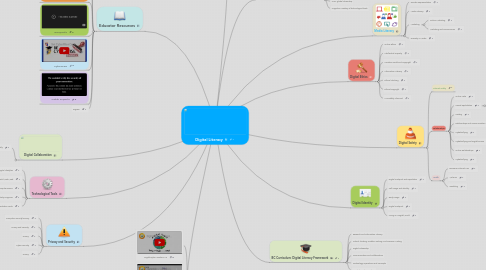Digital Literacy
создатель Gloria Ma


1. Interactives
1.1. Digital Bytes: Grades 9-12
1.2. Digital Compass: Grades 6-8
1.3. Digital Passport: Grades 3-5
1.4. Webonauts Internet Academy
1.5. Safety Land
2. Professional Development
2.1. Webinars
2.2. Professional Learning Communities
2.3. Curriculum Training
2.4. Resources
3. Educator Resources
3.1. Microsoft Digital Literacy Curriculum
3.2. Common Sense Education: Digital Citizenship
3.3. Media Smarts
3.4. iKeepSafe
3.5. Cyberwise
3.6. Cable Impacts
3.7. Digizen
4. Privacy and Security
4.1. Computer Security/Privacy
4.2. Privacy and Security
4.3. Privacy
4.4. Cyber Security
4.5. Privacy
5. Technological Tools
5.1. Digital Lifestyles
5.2. Internet, Cloud Services, World Wide Web
5.3. Computer Basics
5.4. Productivity Programs
5.5. Presentation Tools
6. Digital Collaboration
6.1. Working Together Digitally
7. 8 Elements by Doug Belshaw
7.1. Constructive: re-using, adapting
7.2. Cultural: contextual technology use
7.3. Critical: perspective-taking
7.4. Creative: risk-taking, innovating
7.5. Communicative: communication technologies
7.6. Confidence: self-learning, competence
7.7. Civic: global citizenship
7.8. Cognitive: mastery of technological tools
8. BC Curriculum: Digital Literacy Framework
8.1. Research and Information Literacy
8.2. Critical Thinking, Problem Solving, and Decision Making
8.3. Digital Citizenship
8.4. Communication and Collaboration
8.5. Technology Operations and Concepts
8.6. Creativity and Innovation
9. Digital Safety
9.1. Internet Safety
9.2. Relationships
9.2.1. Online Hate
9.2.2. Sexual Exploitation
9.2.2.1. Pornography
9.2.3. Sexting
9.2.4. Relationships and Communication
9.2.5. Cyberbullying
9.2.6. Cyberbullying and Digital Drama
9.2.7. Online Relationships
9.2.8. Cyberbullying
9.3. Health
9.3.1. Excessive Internet Use
9.3.2. Violence
9.3.3. Gambling
10. Digital Ethics
10.1. Online Ethics
10.2. Intellectual Property
10.3. Creative Credit and Copyright
10.4. Information Literacy
10.5. Ethical Thinking
10.6. Ethics/Copyright
10.7. In-Credibly Informed
11. Digital Identity
11.1. Digital Footprint and Reputation
11.2. Self-Image and Identity
11.3. Body Image
11.4. Digital Footprint
11.5. Living in a Digital World
12. Media Literacy
12.1. Gender Representation
12.2. Media Literacy
12.3. Marketing
12.3.1. Online Marketing
12.3.2. Marketing and Consumerism

